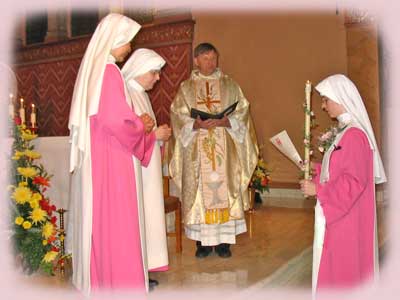Following Christ
in the Evangelical Counsels
Chastity, Poverty, and Obedience
Hail Heavenly Spouse

“Impelled by the love poured into our hearts by the Holy Spirit, we bind ourselves by simple public vows to consecrated chastity, evangelical poverty, and apostolic obedience. Thus we attain greater stability and freedom to love God with undivided heart and to devote ourselves entirely to our vocational tasks.”
From our Constitutions
The Evangelical Basis
of Consecrated Life
By professing the evangelical counsels, consecrated persons not only make Christ the whole meaning of their lives but strive to reproduce in themselves that form of life which he, as the Son of God, accepted in entering this world. By embracing chastity, they make their own the pure love of Christ and proclaim to the world that He is the Only-Begotten Son who is one with the Father. By imitating Christ's poverty, they profess that He is the Son who receives everything from the Father and gives everything back to the Father in love. By accepting Christ's filial obedience, they profess that he is infinitely beloved and loving, as the one who delights only in the will of the Father, to whom he is perfectly united and on whom he depends for everything.
Pope John Paul II (Vita Consecrata)

A vow is a deliberate and free promise made to God concerning a possible and better good which must be fulfilled by reason of the virtue of religion. A religious institute is a society in which members, according to proper law, pronounce public vows and live a life in common. (From the Canon Law of the Catholic Church)
According to St. Thomas Aquinas, a vow is a natural act of worship of God. The evangelical counsels, when offered to God under vow, cause the very being and actions of the religious to become a living sacrifice, in conformity to that of Christ. By the grace of the vow, the individual receives the supernatural help to fulfill a commitment that lasts an entire lifetime. The vows fix the will of the religious in a stable way on the good of total self-giving to God.
The deepest meaning of the evangelical counsels is revealed when they are viewed in relation to the Holy Trinity, the source of holiness. They are in fact an expression of the love of the Son for the Father in the unity of the Holy Spirit. By virtue of their dedication lived in fullness and in joy, consecrated women are called in a very special way to be signs of God's tender love toward the human race.
Consecrated Chastity
In a celibate state of life, Jesus Christ dedicated himself entirely and with undivided love to the work of glorifying the Father and of redeeming the world. Consecrated celibacy, like Christian marriage, is a sign and expression of love. It binds us directly to the Lord, makes us open for his concerns, generous in dedication to his interests, and selfless in the service of others. Therefore, like Christian marriage, it is a possible and satisfying way of life; a sharing in the bridal mystery of the Church; a source of spiritual fecundity; and a sign of that wondrous marriage bond between the Church and Christ, her only spouse, a union which will be fully manifested in the world to come. In Mary, virginal love became fruitful in motherhood, not only because she bore the Savior, but also since she cooperated, out of love, so that the faithful might be born in the Church. We confidently ask her to help us to live out our vow from day to day in the strength and joy of the Holy Spirit, so that our virginal love may become fruitful for the Church in spiritual motherhood.
Evangelical Poverty
Jesus freely assumed poverty in order by his poverty to make us rich (cf 2 Corinthians 8:9). When a person sells what she possesses
and gives to the poor
she discovers that those possessions and the comforts she enjoyed were not the treasure to hold on to. The treasure is in the heart, which Christ makes capable of giving to others by the giving of self. The rich person is not the one who possesses but the one who is able to give. Answering the Lord's call, we leave home and possessions, bind ourselves by vow to evangelical poverty, and place ourselves and all our resources at the service of our mission. We observe poverty not for its own sake, but that it may make us and the goods of our community free and available. Our life of poverty acquires its deeper meaning and value when it leads us to poverty of spirit, which has no limit and allows us to accept consciously and with gratitude our creaturely dependence on God. Through our availability and openness to God and others and our humble recognition and acceptance of our limitations and weaknesses, which we thereby transcend, we attain to that joy promised in the Beatitudes.
Apostolic Obedience
Jesus came not to do his own will but his Father's. Moved by the spirit of Love, he redeemed the world by his obedience even to accepting death on a cross. Obedience, practiced in imitation of Christ, shows the liberating beauty of a dependence which is not servile but filial, marked by a deep sense of responsibility and animated by mutual trust. In a spirit of faith and love, we place ourselves and our wills by vow at the service of God and of the community to which we were called. Individually and collectively, we seek to know and to fulfill God's will and to realize the Lord's obedience in our community in such a way that it can be a witness and example to others. With a sense of responsibility, we accept the duties entrusted to us and use our powers of understanding and will, as well as our gifts of nature and grace, in order to contribute to the upbuilding of the body of Christ.

Ave Sponse Coelestis

Hail Heavenly Spouse
The betrothal ring that we receive at perpetual profession of vows bears a symbol of the Holy Spirit and the inscription Ave Sponse Coelestis
(Hail, Heavenly Spouse). This dates all the way back to the very first perpetual profession in 1901, when the Adoration Sisters and Mission Sisters were still one Congregation, and is part of our spiritual tradition. For our Founder, St. Arnold Janssen, the thought of the Holy Spirit as Spouse was part of his spirituality from very early on. From his father he had inherited the veneration of the Holy Trinity and a special devotion to the Holy Spirit. In 1874, before he had founded his three Congregations, he wrote:
“Let us praise the entire Most Holy Trinity,
and especially that blessed, third Person,
through whom, in the language of the saints,
the great God kisses us with the kiss of holy creator,
fatherly and even spousal love,
as He gives Himself totally to us in sanctifying grace.”
Over the years, veneration of the Holy Spirit took on more and more importance in St. Arnold's life, so it was instinctive for him to name both of the Sister's Congregations for the Holy Spirit. The co-foundresses of both the contemplative and active branches also brought the veneration of the Holy Spirit with them from home, and so the Sisters thus found it most natural to address the Holy Spirit as Thou, heavenly Spouse.
The first Constitutions of 1891 (again, while both branches were still one Congregation) stated: Through their holy vows the Sisters are consecrated in a special way to God and become at the same time brides of Jesus Christ and of the Holy Spirit, whose special servants they are.
St. Arnold venerated Mary, the Mother of Jesus, as “Daughter of the eternal Father, Mother of the divine Son, and Spouse of the Holy Spirit.” Through her Fiat,
Mary became the Spouse of the Holy Spirit
and was, at the same time, the first servant of the Holy Spirit. Her Fiat made the incarnation of the Divine Word possible, the beginning of redemption through Jesus Christ. St. Arnold placed Mary as a model before his Servants of the Holy Spirit. It is clear that to be a servant of the Holy Spirit
after the example of Mary is possible only in spousal dedication to the eternal Love, the Holy Spirit. Seen in this way, our name Servants of the Holy Spirit
and the greeting on the profession ring Ave Sponse Coelestis
are intimately connected.
For St. Arnold, his veneration of the Holy Spirit was a continuation of his intense veneration of the Sacred Heart of Jesus. Some of his expressions were “We hope that we receive a stream of graces of the Holy Spirit from the Heart of Jesus” and “Heart of Jesus, filled with the Holy Spirit!” The love of Jesus IS the Holy Spirit, and this connects our identity as a spouse of the Holy Spirit with the Church's teaching that through the profession of the evangelical counsels the nun becomes a spouse of Christ.
The Church teaches that a marriage bond has three qualities: it is free, faithful, and fruitful. According to Pope John Paul II, A woman is 'married' either through the sacrament of marriage or spiritually through marriage to Christ. In both cases marriage signifies the 'sincere gift of the person' of the bride to the groom
(Mulieris dignitatem). Spousal love is a total love of self-giving. The religious profession, springing from an interior encounter with the love of Christ and made as a free response to that love, creates a new bond between that person and the One and Triune God, in Jesus Christ. The religious is consecrated to God as his exclusive possession and through the evangelical counsels conforms her life to Christ: the chaste, poor, and obedient One. Virginal love becomes fruitful in the spiritual realm, through the power of the Holy Spirit. The evangelical ideal of virginity cannot be compared to remaining simply unmarried or single, because virginity is not restricted to a mere "no", but contains a profound "yes" in the spousal order: the gift of self for love in a total and undivided manner.

“This is the only-begotten Son of God, the only-begotten Son of a virgin, also the only spouse of all holy virgins, the fruit, the glory, the gift of holy virginity, whom holy virginity brought forth physically, to whom holy virginity is wedded spiritually, by whom holy virginity is made fruitful and kept inviolate, by whom she is adorned, to remain ever beautiful, by whom she is crowned, to reign forever glorious.”
(St. Fulgentius of Ruspe)
